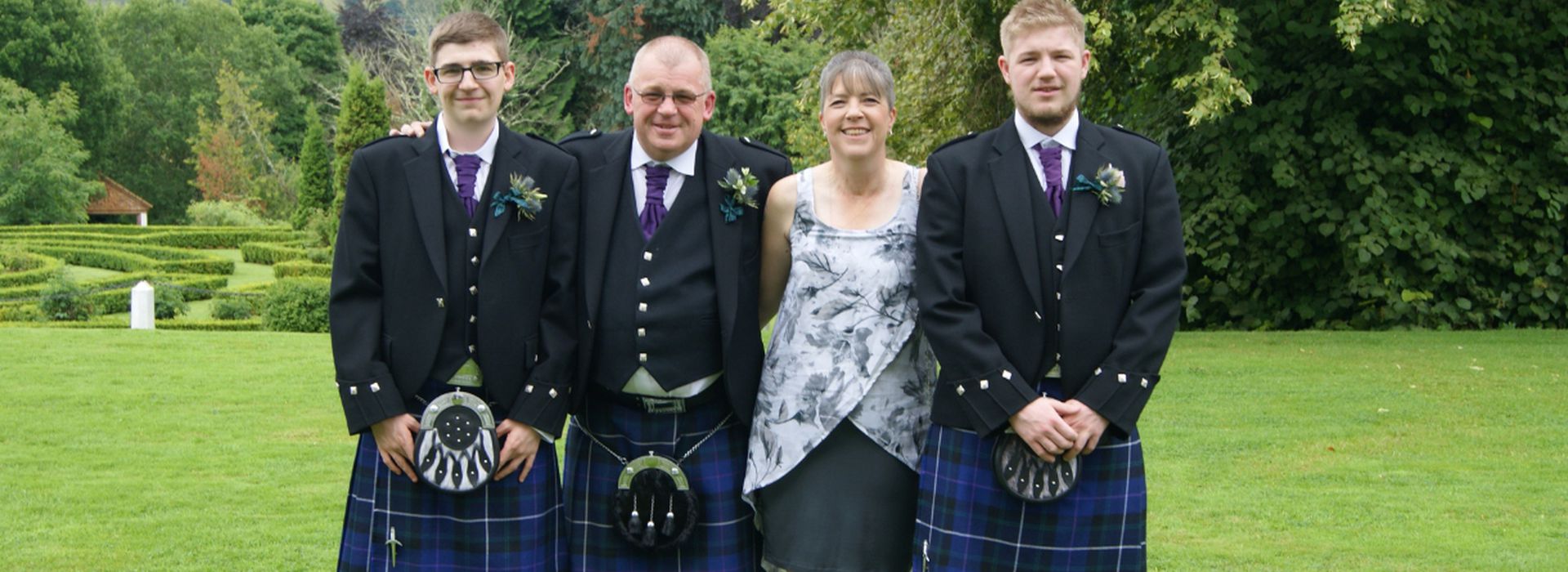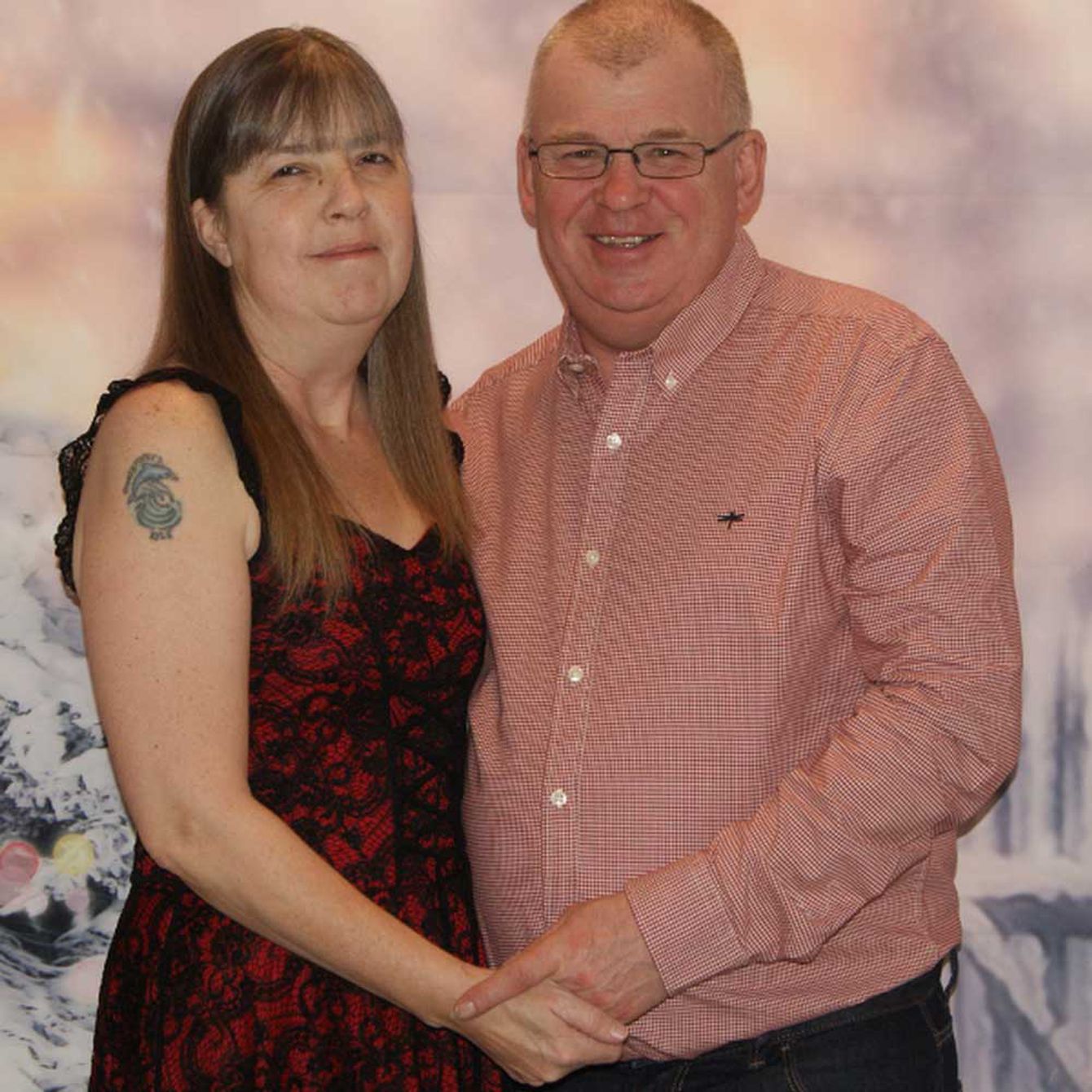Davy on becoming a carer, grief and the importance of talking
Friday 14 June 2024
Maggie's, Highlands

Lorna and I had been together since just before she turned 16. We've been married 37 years, together for 39.
I worked in the offshore oil and gas industry. I would be away working for three weeks at a time and then come home. While I was away, I would phone Lorna a couple of times a day. My niece always used to ask me 'why are you phoning her so much?' I’d reply that I just loved hearing her voice.
In October 2020, Lorna was admitted to hospital with a possible stroke. Her speech was slurred, vision all over the place and she was confused. I got back from offshore to the hospital that night to be with her.
After several MRI’s, we were told that Lorna had a tumour on her brain. She had surgery to remove the tumour two weeks after being diagnosed. I took Lorna to the hospital in Aberdeen and had to leave her at the door. It was hard, not knowing if I was going to see her again.
But the surgery seemed to go well; the surgeon told us he had got virtually all of the tumour out. She would have some chemo and radiotherapy and that would be it.

Shocking news, making it through Christmas
However, we had a phone call the week before Christmas from the oncologist. He told us that it was stage four; the cancer was terminal. Lorna had about fifteen to eighteen months to live.
Neither of us could deal with this news that had just come completely out of the blue. To face having our 37 years of marriage taken away from us put us into a very dark place. We got Christmas out of the way, trying to keep a brave face for our sons.
But, between Lorna and I, we shared a river of tears in that period. We couldn’t understand how this could be happening after the surgeon said he had been happy with the surgery.
We told our two sons shortly after Christmas, but kept the terminal diagnosis from everybody else until March.
Come March, we decided we needed to tell the family what's going on. I also wanted to try and regain some normality in life, so I went back to work offshore for three weeks.
My manager could see that I was struggling and told me that I didn’t seem well enough to be at work. He was right. From then on, I was put on sick leave, and I still am to this day.
Finding Maggie’s
Lorna’s six weeks of radiotherapy and six weeks of chemotherapy started just after Christmas. Every morning, we drove to Inverness for treatment and back and forth for months. I knew the Maggie's centre was there, right beside the hospital, but had never been in. A radiotherapist told me that if I was struggling, I should go and see them. I phoned them and spoke to a lovely lady called Eilidh, who suggested I came in to see her.
As soon as I walked in, a friendly volunteer offered me a drink. Eilidh came down and we went into the big sun lounge. I told her my story and I ended up in a mess; I just wasn't coping at all. But I felt okay afterwards. It was a release; the pressure came off after I opened up to Eilidh.
I made another appointment to come back. I’ve been there ever since every other Wednesday, without fail for the last three years.
We would talk about everything: how I was coping, how my two boys were, how to deal with our emotions and the day to day. What I did when I had a meltdown, how I got past them. What me and Lorna had been doing to make memories. I got a lot out of just talking with Eilidh.
Caring for Lorna
All of a sudden, I had gone from being at work and being the main breadwinner, to having an apron on, cooking and cleaning which was all new to me. I became a full-time carer. This was quite easy to start with as Lorna was still quite mobile, I was just giving her a hand. But things changed a lot after her second operation to remove the regrowth of the tumour.
Lorna started getting bad dizziness from her medication, which led to a couple of falls. The caring really started around then, making sure that she didn’t hurt herself. As things progressed, I had to do more and more, including being a taxi driver because Lorna had her driver’s license taken away.
Maggie’s support throughout
I’ve been going to Maggie’s this whole time, I didn’t stop when Lorna died. Once a month, I see Jack, the Psychologist, before I see Eilidh, and we have a good chat. I began seeing Jack in August 2023 when Lorna started really deteriorating.
I feel like I’m not going insane when I talk to Jack. He checks up on me, making sure I am not going to a really dark place.
Don’t get me wrong: when Lorna passed away, I did think “what’s the point in carrying on?” But then, I look at my two sons, and I think “that’s the point”.
I still, to this day, feel that I’m miles away from being where I used to be in life. I think that what I have seen Lorna go through, and what I have had to deal with up to her passing, has scarred me for life. But to know the support is always there, to go for a blether and have a cup of tea and a cake. I always feel so much better when I come out.
Words to others
My advice is to reach out and grab all the help you can. I think the hardest part is to open that door, walk through it and say “listen, I need a wee bit of help here”. Men are stubborn and don't speak out a lot, but it's just purely bravado.
We're seen as the masculine person, the man of the house, someone who should be able to carry this burden. Trust me, you can't carry the burden on your own.
I'm glad I made that step early. I built a relationship with the centre before Lorna passed away. I went in a week after she died, and every single person was absolutely incredible. If I didn't have the support of Maggie's I don't know where I would've ended up, probably with me having a breakdown.
If I can help one person get through the door of Maggie's and get the help I got, then I think I've done a good job.
We’re here with you
Our cancer support specialists, psychologists and benefits advisors are here for everyone with cancer, and all the people who love them.
Come and see us at your nearest Maggie’s, call us on 0300 123 180 or email us at enquiries@maggies.org
